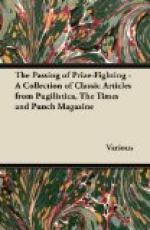Thursday, June 21st.—During Sir EDWARD GREY’S long tenure of the Foreign Secretaryship he rarely visited the House of Commons more than twice a week. Until his voyage to the United States, Mr. BALFOUR was even less attentive to his Parliamentary duties and left most of the “donkey-work”— if one may so describe the business of answering the questions of curious Members—to Lord ROBERT CECIL. Since his return Mr. BALFOUR has developed a new zest for this pastime, and to-day for the third time in succession appeared in his place. Everybody is pleased to see him there, except perhaps the curious Members aforesaid, who find him even more chary of information than his deputy. Had not the PRESIDENT of the United States said something about Alsace-Lorraine? ventured Corporal LEES-SMITH. Mr. BALFOUR, fresh from the White House, blandly replied, “I do not propose to discuss President WILSON’S Notes.”
The notion, prevalent at the beginning of the War, that every German waiter was an emissary of the KAISER, only awaiting “The Day” when he should return to take a full revenge for meagre gratuities, still subsists in certain minds. Mr. BROOKES was manifestly disappointed when Dr. MACNAMARA assured him that the aeronaut captured in the recent raid was not, as he supposed, one of these returned Ganymedes, but was making his first appearance on English soil.
* * * * *
“A small fire at a variety
theatre burnt some dresses all up, but the
revue went on as usual.”—Berrow’s
Worcester Journal.
No need to worry over little things like that.
* * * * *
[Illustration: Long-suffering Sergeant. “WE GOT ANOTHER ARF-HOUR TO GO YET. I DON’T KNOW WHAT TO DO WITH YER.”
Rookie (suggestively). “THERE’S SOME TREES OVER THERE, SERGEANT.”
Sergeant. “YES, I KNOW. BUT THERE AIN’T ANY ROPES.”]
* * * * *
TO FIELD-MARSHAL SIR DOUGLAS HAIG.
JUNE 19TH, 1917.
Sir, though in dealing with the strong
and straight
Of sentiment one cannot be
too thrifty,
Still, after reading your despatch—the
date
Chimes with your birthday,
aetat six-and-fifty—
A humble rhymer, though denied by fate
Possession of the high poetic
“giftie,”
May yet express the hope it won’t
displease you
To see yourself as one plain person sees
you.
Some call you cold, because you are not
prone
To bursts of eloquence or
flights of feeling;
You do not emulate the fretful tone
Of those who turn from boastfulness
to squealing;
Your temperament, I am obliged to own,
Is not expansive, Celtic,
self-revealing;
But some of us admire you none the less
For your laconic simple truthfulness.




